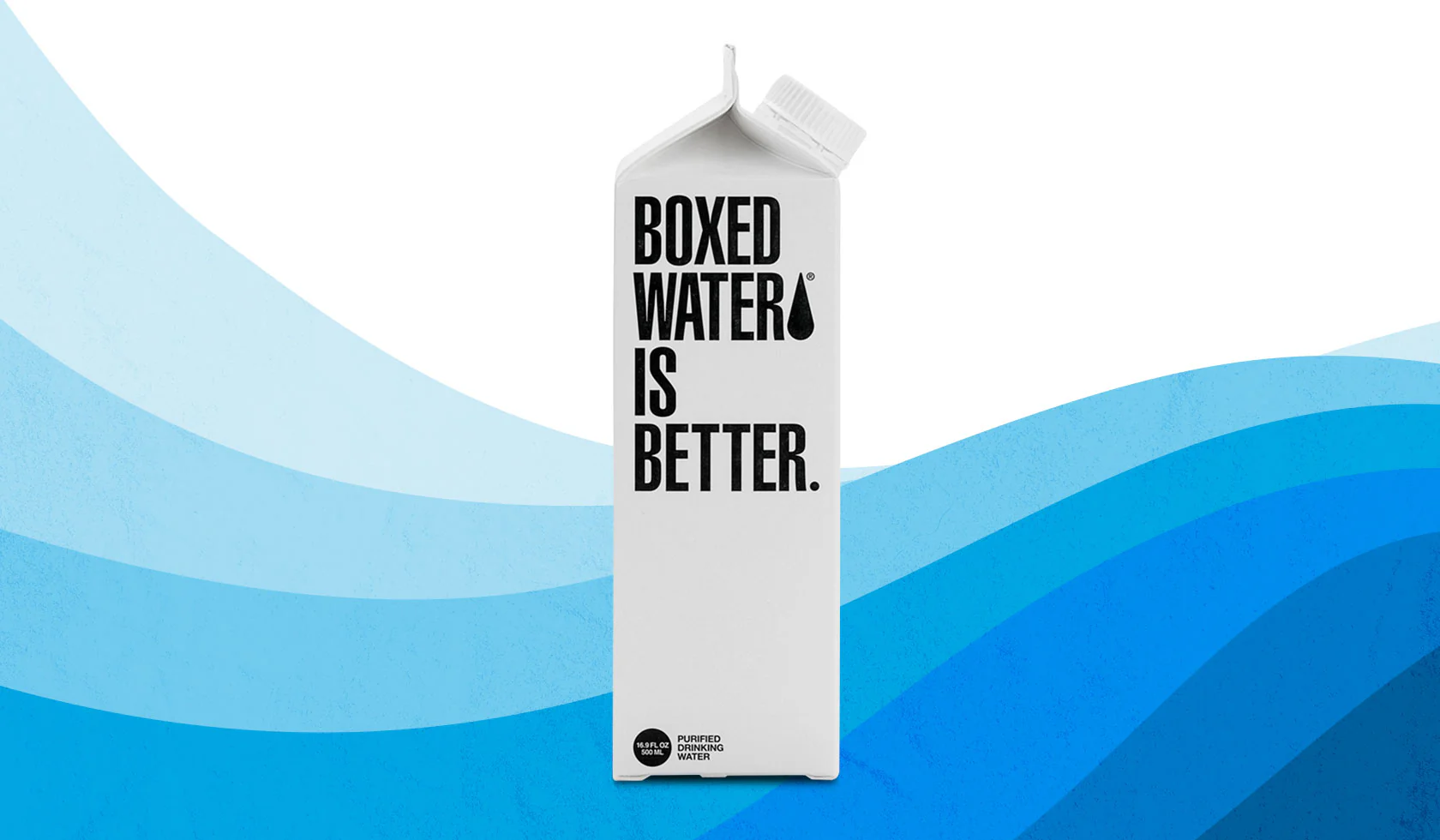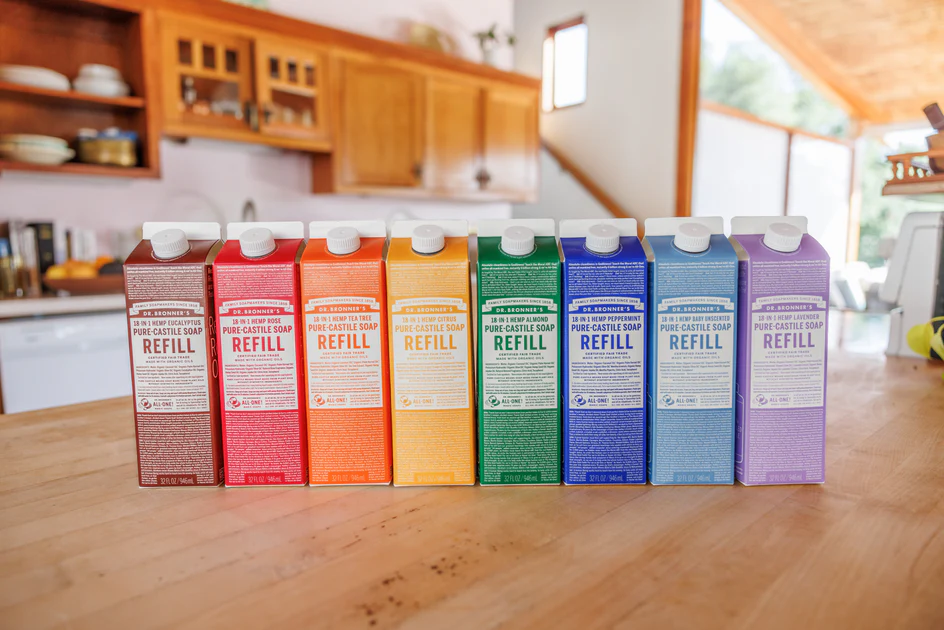How Boxed Water, Mondi Group, and Dr. Bronner's Leverage Life Cycle Assessments for Packaging

Packaging Innovation Dashboard
Don't know what an LCA is? Check out our blog here, and then return to this piece for a more concrete understanding of these case studies.
Boxed Water | Comparative LCA for Paper Cartons

Photo from Boxed Water
In 2020, Boxed Water partnered with Anthesis, a sustainability consulting firm, to conduct a cradle-to-grave life cycle assessment to compare Boxed Water’s paper cartons to conventional packaging formats like PET and aluminum. A cradle-to-grave LCA looks at the impacts from raw material extraction (cradle) to end-of-life (grave) and all the externalities in between.
In short, the study revealed that “Boxed Water cartons have a lower total environmental impact than plastic bottled water and aluminum cans.” Let’s dive into some key findings from the 3-month LCA process:
Boxed Water cartons (paper-based) were found to have 50% lower ozone depletion potential than water packaged in aluminum.
Boxed Water cartons were found to have 36% less global warming potential than water packaged in PET bottles.
Boxed Water cartons were found to have 43% less eutrophication potential than water packaged in PET bottles. Eutrophication potential refers to the potential of the processes in the life cycle of a product / package or service to release an excess of macro-nutrients (nitrogen and phosphorus) into waterways and other ecosystems, resulting in excess algal blooms and more devastating impacts on ecosystems.
Boxed Water cartons were found to have 33% less ocean acidification potential than water packaged in aluminum.
The LCA study also explored the comparative impacts of smog, resource depletion, and more—check out the full study by Anthesis here.
Learn more about the impacts of Boxed Water cartons as compared to conventional packaging formats for water here.
Story from Boxed Water
Mondi Group | Comparative LCA for Hug&Hold

Photo from Mondi Group
In May of 2024, Packaging Gateway reported that Mondi Group conducted a life cycle assessment (LCA) to compare the environmental impacts of their new paper-based Hug&Hold solution to their conventional low-density polyethylene (LDPE) shrink wrap for beverage bottle multi-packs.
Mondi’s LCA was cradle-to-grave, covering the stages of raw material extraction through end-of-life / disposal; the LCA was ISO-14040 compliant and analyzed 16 different impact categories.
In short, the study revealed that the kraft paper and corrugated Hug&Hold solution “significantly reduces environmental impacts in various categories when compared to plastic shrink wrap.”
Other insights include the following:
The Hug&Hold solution has a 43% lower carbon footprint compared to a virgin plastic (LDPE) solution.
The Hug&Hold solution has a 15% lower carbon footprint compared to a 100% recycled plastic (LDPE) solution.
As we highlighted above, the full LCA investigated 16 different impact categories, and we only included those related to emissions, often categorized as global warming potential (GWP). You can request access to the full LCA study on this page.
Silvia Hanzelova, Sales Director of Specialty Kraft Paper at Mondi Group, was cited in Packaging Gateway, stating:
"Mondi values independent and a data-driven route to help customers assess the environmental impact of their products. This LCA on Hug&Hold delivers on that. The results play a vital role in our customers’ decision-making process, which ensures that we keep creating solutions in line with our MAP2030 (Mondi Action Plan 2030) commitments, providing effective and creative solutions—that are sustainable by design and success in application."
Read the full story here.
Story from Packaging Gateway
Dr. Bronner's | LCA for Soap Refill Cartons

Photo from Dr. Bronner's
In July of 2023, Dr. Bronner's, a US soap and personal care product company, released a 32-oz, paper-based carton to refill their standard rPET bottles. The decision was driven by a life cycle assessment (LCA), which found that the paper-based carton had the lowest environmental impact when compared to PCR plastic, molded fiber, glass, and aluminum.
The LCA uncovered that the use of paper-based cartons to refill rPET bottles was the most sustainable packaging system assessed (as paper cartons are not as moisture resistant). The carton is made from 69% FSC-certified paper, 5% aluminum, 26% polyethylene, and a polypropylene cap.
Darcy Shiber-Knowles, Director of Operation Sustainability & Innovation at Dr. Bronner's, was featured in a Packaging World article stating:
"The carton is not plastic free, it's single-use, but each carton is over 90% less plastic than its 32-oz counterpart. And even if it goes to landfill, it has a lighter environmental impact than all the alternatives being recycled."
Dr. Bronner’s work shows how LCA can be used as a tool throughout the packaging development process, to help guide brands to the best possible packaging systems (in terms of sustainability and reducing environmental impact).
Dive deep into the process and Dr. Bronner’s sustainable packaging initiatives here.
Story from Packaging World
Learn How to Conduct a Packaging LCA
As Boxed Water, Mondi Group, and Dr. Bronner’s have demonstrated, life cycle assessments can be a valuable tool to help compare different packaging materials, processes, systems, and more. As with all assessments, LCAs certainly have their flaws, but they have proven to be one of the best tools to benchmark, compare, and optimize packaging designs for sustainability.
The LCA process can be robust and daunting . . . but don’t fear! At the Packaging School, we can teach you how to conduct an LCA using a software designed to run packaging-specific LCAs and environmental assessments. Learn more about our Certificate of Sustainable Packaging here.
By signing up you indicate you have read and agree to our Terms of Use. Packaging School will always respect your privacy.